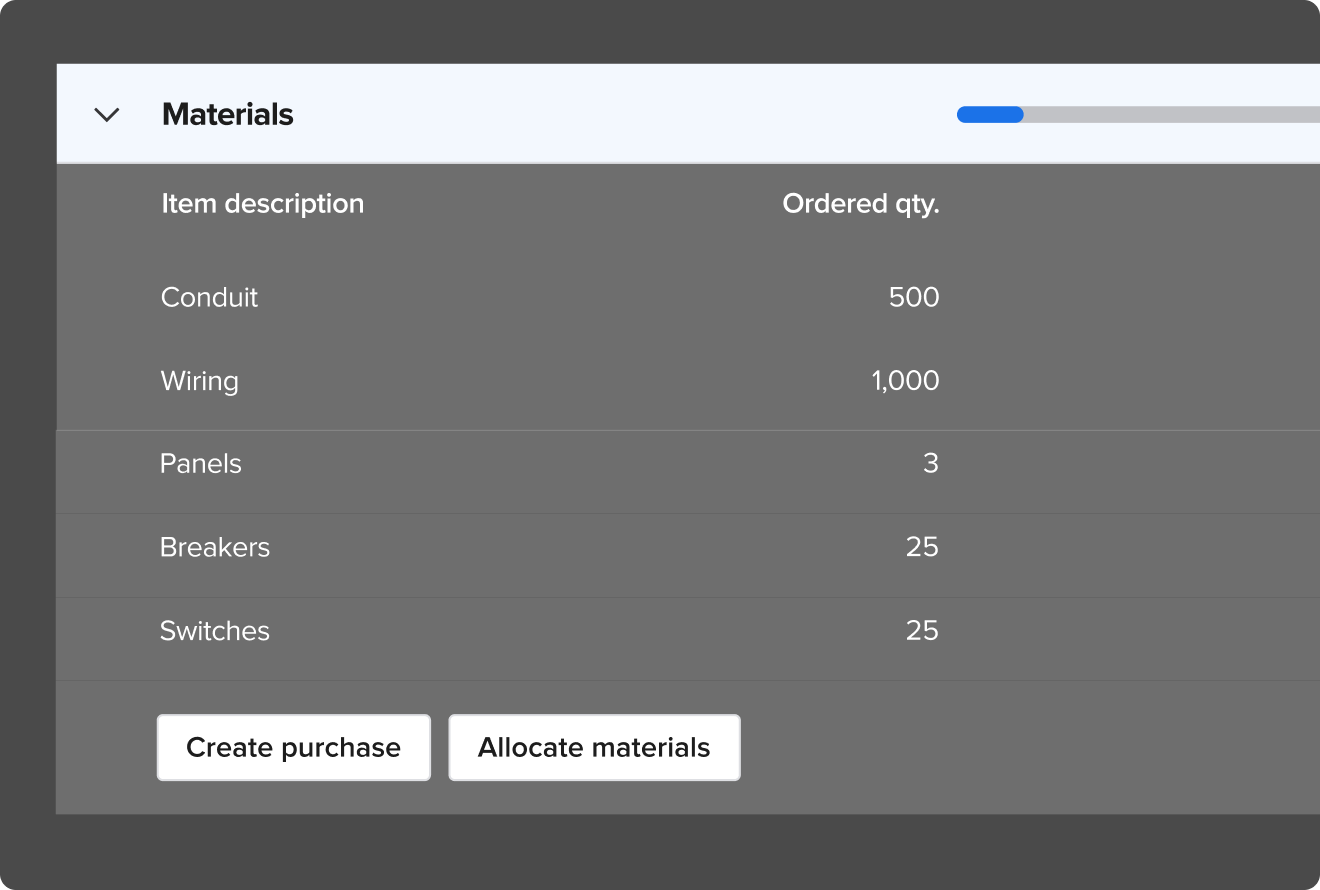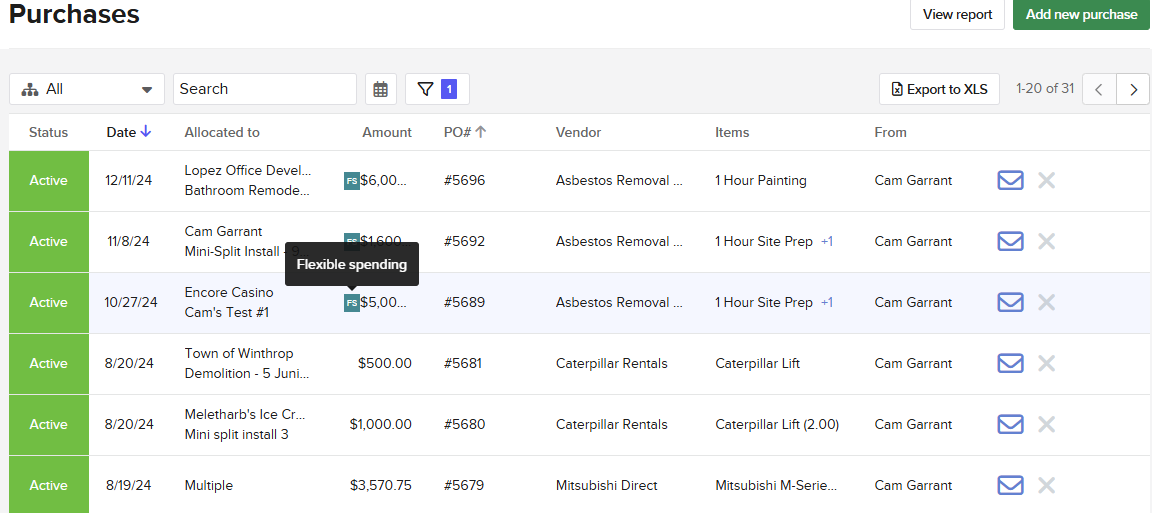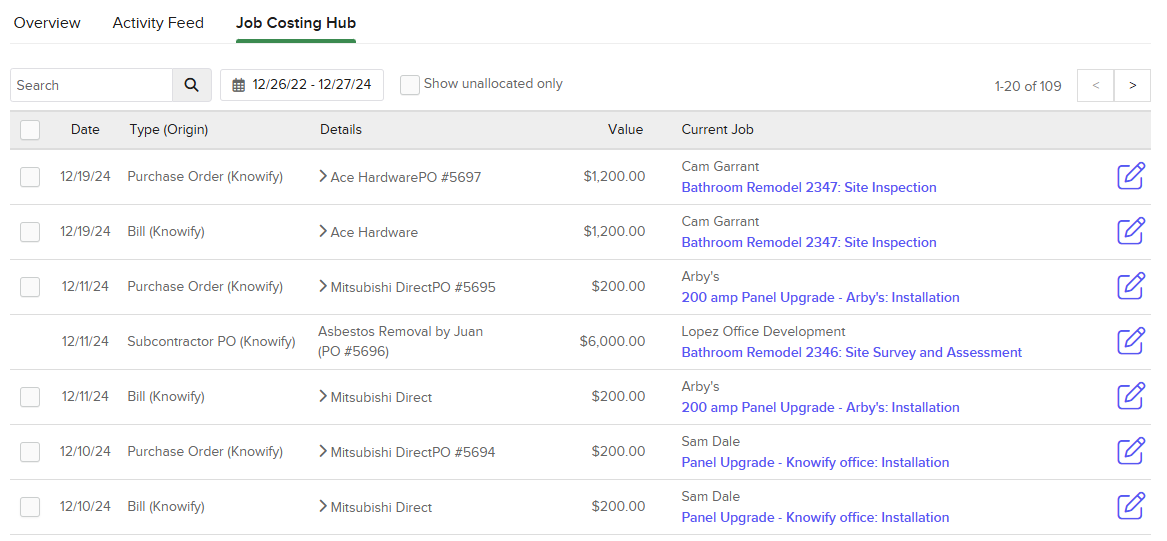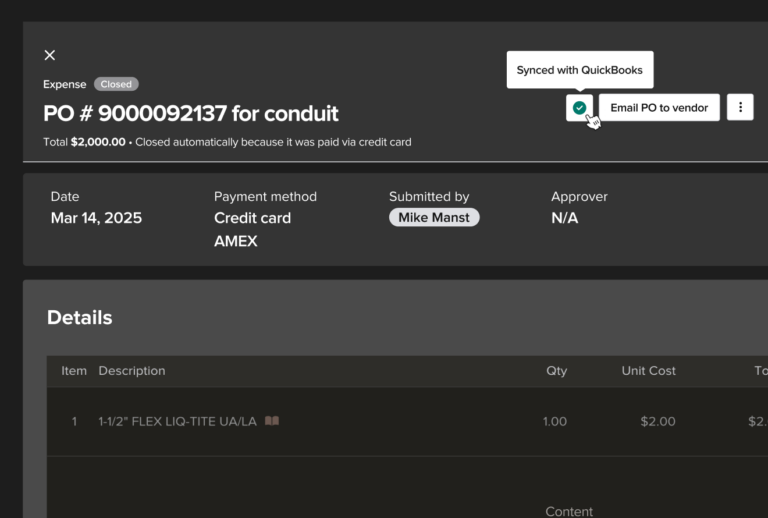Tackle purchasing for all your construction projects, starting at $99/month
An easier way to manage your finances, without sacrificing accuracy or speed. Schedule a personalized walkthrough of Knowify today.
Create purchase orders directly from your project budget. Log expenses from the web app or mobile app, and set approval limits for your employees.
A best in class two-way sync ensures your team only enters data once, and that it’s up-to-date and properly organized in both platforms.
A dedicated hub for purchases and vendor bills means you can easily track committed costs and take quick action, like marking line items as received or emailing vendors directly.
Manage purchase orders, vendor bills, and expenses between Knowify and QuickBooks with one-time data entry in a user friendly interface.
Generate purchase orders directly from your project budgets with just a few clicks, so committed costs are assigned to right part of the job, down to the project phase. Upload supporting documents and email purchase orders directly to vendors as needed. Knowify automatically pulls unit prices from your product catalog.

Assign spending limits and flexible spend to employees, track reimbursements, and log expenses easily from the field or office.

Manage all purchases, expenses, and vendor bills in an organized central place that syncs with your accounting system. Filter by date or po status and see a timeline of activity for every transaction. Easily share transactions for further review, mark bills as paid, and more.

A real-time two-way sync means you can manage purchase orders, bills and expenses in either Knowify or QuickBooks, and have confidence that your data is complete and up-to-date in both platforms. Automatic vendor invoice matching takes the pain out of manual reconciliation, and ensure the entire purchasing process runs smoothly.

An easier way to manage your finances, without sacrificing accuracy or speed. Schedule a personalized walkthrough of Knowify today.
Purchase orders (PO) are formal documents that contractors send to suppliers, subcontractors, etc. indicating that they’d like to purchase specific materials or services. For example, a carpenter might submit a purchase order to a lumber yard for framing materials. An electrician acting as a subcontractor might receive a purchase order from a GC requesting wiring services for a home build.
Purchase orders are important because they act as a formal agreement between two parties specifying quantities, costs, payment terms, delivery dates, etc. Purchase orders are an important way to maintain accurate financial records, prevent disputes between buyers and sellers, and help with inventory tracking.
Effective purchase order management is crucial for businesses to streamline their procurement process, reduce costs, and increase efficiency. By implementing a purchase order management system, companies can automate the creation, approval, and tracking of purchase orders, eliminating manual errors and discrepancies. This leads to improved relationships with suppliers, better inventory management, and enhanced financial control. Additionally, purchase order management software provides real-time visibility into spending, enabling businesses to make informed decisions and optimize their procurement process.
While it’s possible to create and manage purchase order manually using spreadsheets, email, and hard copies, for a busy contractor, software is a better choice. Contractors should look for construction purchase order software that first makes it easy to generate and send purchase orders without the need for any manual work.
They should also look for a tool that integrates with their job costing system as purchases are a major source of project costs. When your construction purchase order software works alongside your job costing software, you can easily mark when a purchase order is fulfilled, and the bill is paid, and see how those actual costs track against your budgeted costs in near real-time.
Lastly, it’s ideal that your PO software integrates with your accounting software so your bookkeeper and accountant always have accurate financial records.
A robust construction purchase order software should offer the following key features:
By incorporating these features, businesses can ensure a seamless and efficient procurement process, from creating purchase orders to managing supplier relationships and tracking inventory.
Implementing a purchase order management system can seem daunting, but with the right approach, businesses can quickly reap the benefits of streamlined procurement. Here’s a step-by-step guide to getting started:
Implementation and Support
A successful implementation of a purchase order management system requires dedicated support and resources. Look for a software provider that offers:
By prioritizing implementation and support, businesses can ensure a smooth transition to a purchase order management system and maximize its benefits.
QuickBooks does give you the ability to generate and send purchase orders. This is a great tool for businesses with simpler needs. For contractors and construction companies with more complexities and the need to manage costs at the project level, purchase order software designed for construction makes more sense.
Expense management in construction refers to the meticulous process of tracking, managing, and controlling all costs associated with construction projects. This includes monitoring and recording expenses related to labor, materials, equipment, and other project-specific costs. Effective expense management is crucial for ensuring that projects stay within budget and meet their financial goals.
By keeping a close eye on every dollar spent, project managers and contractors can identify inefficiencies, reduce unnecessary costs, and ultimately improve the profitability of their construction operations. In essence, robust expense management practices are the backbone of successful construction projects, providing a clear picture of the project’s financial status at any given time.
The best way to keep track of construction expenses and construction project costs is with job costing software. Job costing software like Knowify allows you to build a construction budget of estimated costs and then track your actual costs against your budgeted costs as you work on a project.
It’s best to create a detailed budget that divides your project into phases, as well as cost categories under each phase. Typical cost categories include materials, equipment, labor, and subcontractors. You then use purchase orders, invoices, time cards, etc. to track your actual costs by category and type so you have detailed information about how you’re tracking against your initial budget.
Typically, labor is the largest expense on a construction project. Labor costs often range from 40-50% of the total project budget. Labor costs do not only include wages, they also include labor burden which are costs like employment taxes and benefits. It’s important to track your fully loaded labor costs on projects so you don’t go over budget on labor.
Knowify helps you track your labor costs, including labor burden, by letting you set up detailed labor rates for each individual employee or type of employee (Ex: foreman vs. laborer). You can then schedule employees to an entire project or just a project phase. If you use the Knowify mobile app for time tracking, or one of our integrated payroll partners, labor costs will automatically be applied to each project, and/or phase, giving you very accurate labor cost numbers.
Implementing expense management software in construction can revolutionize the way project expenses are tracked and managed. Here are some key benefits:
By leveraging expense management software, construction companies can achieve greater control over their project costs, leading to more successful and profitable projects.
Expense management software for construction is packed with features designed to simplify and enhance the expense tracking process. Here are some of the key features to look for:
These features collectively enhance the efficiency and accuracy of expense management in construction projects, helping construction companies maintain control over their budgets and improve their overall financial performance.